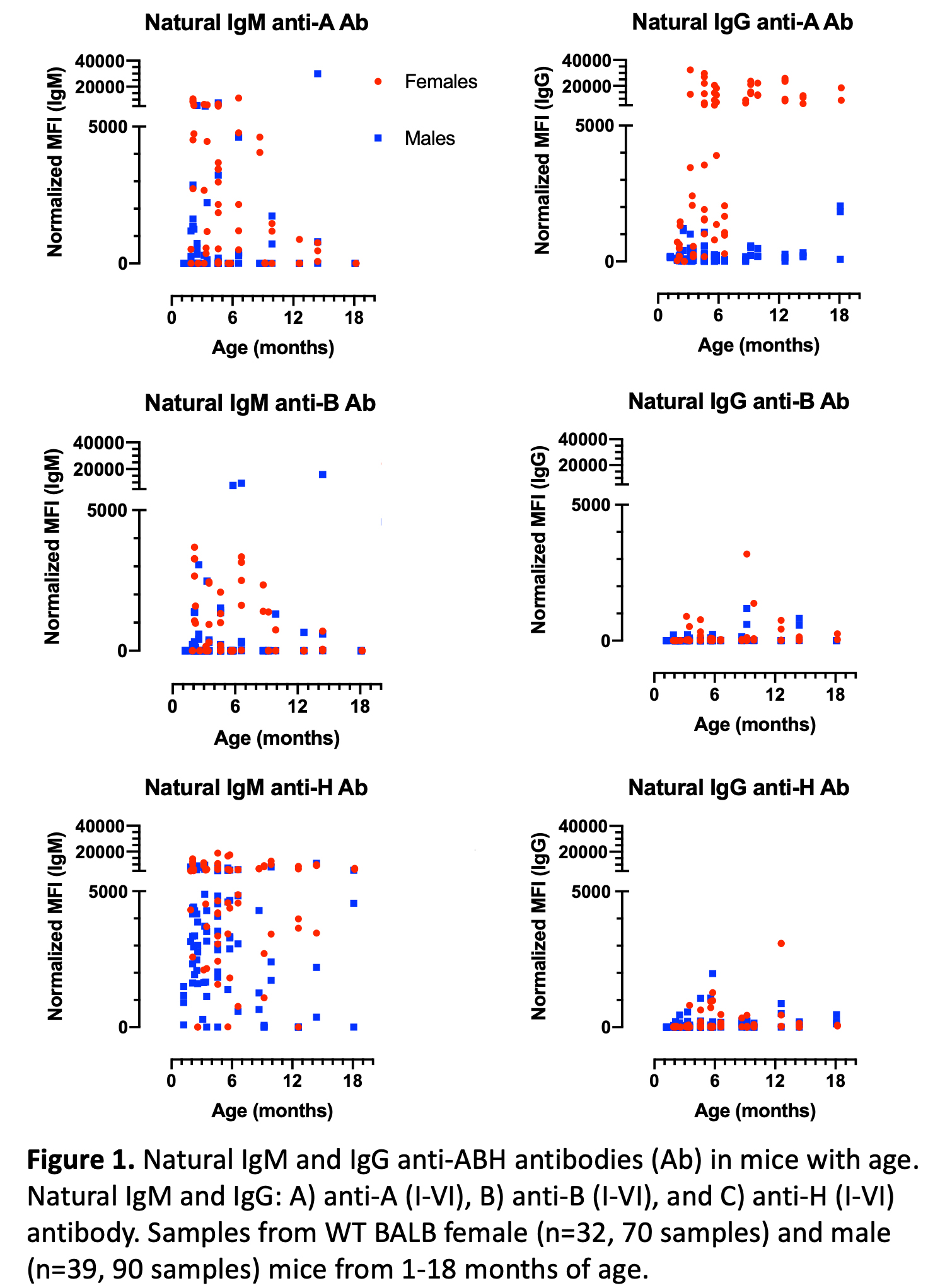Sex and ABO Antibodies: High-Level Natural ABO Antibody Production and IgM to IgG Class Switch in Female vs. Male Mice
Dept Pediatrics, Alberta Transplant Institute, University of Alberta, Edmonton, AB, Canada
Meeting: 2020 American Transplant Congress
Abstract number: D-337
Keywords: Antibodies, B cells, Isoantibodies, Pediatric
Session Information
Session Name: Poster Session D: B-cell / Antibody /Autoimmunity
Session Type: Poster Session
Date: Saturday, May 30, 2020
Session Time: 3:15pm-4:00pm
 Presentation Time: 3:30pm-4:00pm
Presentation Time: 3:30pm-4:00pm
Location: Virtual
*Purpose: ABO histo-blood group incompatibility is a barrier in solid organ transplant due to the presence of ‘natural’ preformed ABO antibodies. However, ABO-incompatible (ABOi) heart transplantation is successful in infants as ABO antibodies are low/absent. A better understanding of the specificity and the production of ABO antibodies may allow for successful ABOi transplantation at older ages. Here, we sought to determine the isotype (IgM/IgG) and subtype (I-VI) specificity of ABO antibodies produced naturally or induced by sensitization in mice as a function of age and sex.
*Methods: BALB/c mice were assessed for natural ABO antibody production over time (n=32/39, female/male; age 1-18 months), or challenged with human A erythrocytes (5 weekly ip injection) beginning at age 5 weeks to measure induced anti-A antibody (n=13/8, female/male; age 1-3 months). Plasma A/B antibody titre was determined by hemagglutination assay using human reagent erythrocytes; ABO antibody isotype and subtype-specificity were assessed by a novel ABH-glycan microarray created in our lab.
*Results: Female mice produced markedly higher natural anti-A antibodies compared to male mice. With age, natural anti-A shifted from IgM to IgG isotype in females but remained predominantly IgM in males (Figure 1). Females tended to have higher anti-B antibodies than male mice and, in contrast to anti-A, anti-B remained mostly IgM. Most natural anti-A antibodies were specific to antigen subtypes III/IV; specificity to subtypes I and II was absent or very low. In contrast, following A-antigen sensitization, both female and male mice produced comparable quantities of IgM and IgG anti-A antibodies with specificities for all subtypes (I-VI).
*Conclusions: We found a dramatic and previously undescribed sex difference in natural ABO antibody production in mice. Markedly higher antibody production together with a distinct propensity to class switching (anti-A) suggest a more complex immune pathway in females than traditionally described for natural antibody to ‘T-independent’ carbohydrate antigens. Future studies will explore mechanisms for these sex differences and relevance to humans.
To cite this abstract in AMA style:
Anjum B, Motyka B, Adam I, Fersovich J, Sulzer M, Pearcey J, Tao K, West LJ. Sex and ABO Antibodies: High-Level Natural ABO Antibody Production and IgM to IgG Class Switch in Female vs. Male Mice [abstract]. Am J Transplant. 2020; 20 (suppl 3). https://atcmeetingabstracts.com/abstract/sex-and-abo-antibodies-high-level-natural-abo-antibody-production-and-igm-to-igg-class-switch-in-female-vs-male-mice/. Accessed February 19, 2026.« Back to 2020 American Transplant Congress

